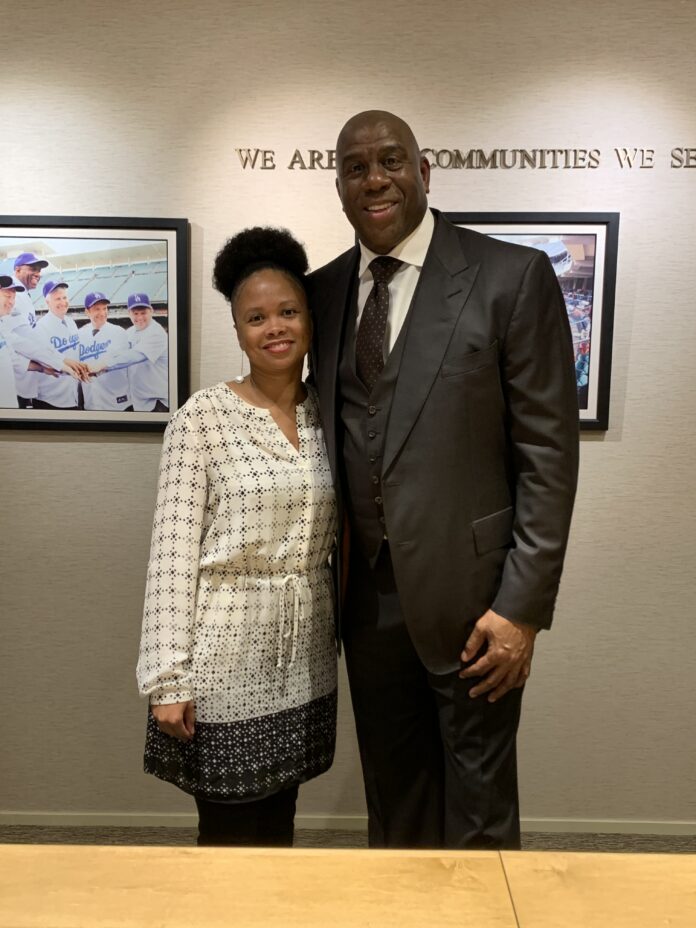From the 2005 founding of her international company, Heritage Link Brands, and successfully carving out an ethical purpose in the $300 billion wine industry to her current role as president of SodexoMagic – a business venture between Magic Johnson Enterprises and Sodexo Inc. – Selena Cuffe continues to evolve and forge new paths as a Black female entrepreneur, business leader and executive.
Yet the paths forged by Cuffe throughout her globe-crossing 25-year career reflect her focus and commitment to addressing educational and economic inequalities experienced by people of color both domestically and internationally.
As evidenced throughout the business operations of the Los Angeles-based Heritage Link Brands’ focus on female and Black winemakers across the African Diaspora, her partnership with Johnson and her role as director of the Council on International Educational Exchange, Cuffe consistently uses her career, economic ventures and global influence to open doors and empower others by increasing business and educational opportunities to address global and domestic economic inequalities in communities of color.
With her appointment as a lifetime member of the Council on Foreign Relations, Cuffe, who earned an MBA from Harvard University, has established herself as a global changemaker and business leader.
Yet early on, as an undergraduate majoring in International Relations at Stanford University, where she received research grants to study abroad in Colombia, Guatemala, Ecuador, and Brazil, and graduated with a bachelor’s degree in International Relations, Cuffe’s goal of combining business and travel to create positive, sustainable change for all of humanity was clear.

Harvard match-making: pairing partners in love and business
A firm believer and advocate of living life with intent, Cuffe has designed her life with precision aim, aligning her education, career, business ventures and interests with ambitious goals of servicing a greater collective good to achieve economic equity and equality for others.
However, when asked about the ultimate catalyst that propelled her to launch her first import company, Cuffe’s response reveals this superwoman’s human vulnerability to a capricious life event and its power: love.
“It is a love story, really,” Cuffe told the Business Journal about the essential role her partner and eventual husband played in her leap from executive to entrepreneur, focusing on fair trade and sustainability before such concepts became the trendy marketing buzzwords they are today.
The year 2005 was filled with many leaps in Cuffe’s professional and personal life. It was the year she launched her first entrepreneurial endeavor, Heritage Link Brands. In April 2005, she married her inspiration and the company’s co-founder, Khary Cuffe, also a Harvard MBA graduate. Khary also received his master’s degree in public administration from Harvard.
She credits her spouse as a source of courage and motivation, giving her the strength to take her first bold step as an entrepreneur in a billion-dollar global industry, which continues to grow. The eldest of the couple’s three children was also conceived that year, as the couple’s new venture took off, further emboldening them in their desire to create a better, more equitable world for their children.
Together, armed with business school educations and in-depth market research, they tackled the challenges and inequalities inherent in the wine industry, a land-based industry which amplifies the immense racial inequities and economic repercussions fostered by the antiquated systems of colonialism, slavery, and apartheid.
The right market timing
After South African Apartheid ended in the 1990s, the world opened to the country’s wine market, exports spiked, and the region experienced a wine renaissance. Post-apartheid technologies and viticultural advancements further boosted the popularity of fine wines produced in the country, such as Shiraz, Cabernet Sauvignon and Chardonnay. Currently, exports constitute 45% of the country’s $3 billion wine industry, according to Beverage Industry Enthusiasts.
The Cuffes’ timing of their venture in 2005 also aligned with other changes in a post-apartheid South Africa, which purportedly allowed for Black winemakers to profit from their work and contributions in the wine industry.
However, apartheid left huge gaps to be filled in the industry.
Cuffe explained that while Black South Africans comprise 85% of the country’s population, they account for less than 2% of their country’s $3 billion market. To shed further light on inequity, this miniscule share of the market exists despite a long history of Black South African winemakers’ experience, innovations and contributions to the country’s viticulture and winemaking industry. Apartheid prevented Blacks from owning vineyards or accessing the necessary capital for expansion into the global market, presenting setbacks the Cuffes could help them overcome.
Cuffe cites the company’s ability to assist these long-term producers in overcoming hurdles in a post-apartheid South Africa to successfully enter the global market as peaks among her many career achievements.
“Helping the first crop – no pun intended – of Black South African wine producers enter the international market is at the top. Investing in the Seven Sisters Vineyards (the first Black female-owned vineyard in Stellenbosch, South Africa) is number two. Helping the Mandela family launch their brand in the United States, Brazil, and Canada, honoring the royal House of Mandela is number three,” Cuffe said.
Special brand addition
The addition of the House of Mandela brand of wines was especially significant for Cuffe, who cites Nelson Mandela as one of her leadership role-models and inspirations.
The two families both recognized South Africa’s growing fair trade wine movement, which promotes equitable trade and labor practices, community development and environmental awareness – culturally positive elements to highlight in a post-apartheid country.
“The Mandela family saw it as a way – through the medium of wine – to support a local economy and to tell the story about their values and their tradition that hopefully can be lessons for other people,” Cuffe said. “We were just stewards of telling their story.”
Global changemaker meets the magic touch
With a diverse, international business career, which includes in-depth knowledge of the beverage and hospitality sectors, Cuffe was well-prepared to lead a 16-year-old venture owned by Magic Johnson, SodexoMagic.
In 2006, NBA champion Johnson partnered with Sodexo Inc., an international firm headquartered in France, and created SodexoMagic to be a service industry leader which also creates equality across the United States.
Johnson – a charismatic star on and off the court – is well known as an enterprising businessman, social advocate, broadcaster, philanthropist, and motivational speaker. He remains a cherished Los Angeles and national icon.
Johnson became a leading voice on how to invest in urban communities, creating redevelopment opportunities in underserved areas, notably through his Magic Johnson movie theaters chain and his partnership with Starbucks.
Johnson and Cuffe met in 2008, at an event hosted by mutual client, American Airlines. Thirteen years later, Johnson saw in her an ideal fit to lead, grow, and innovate his enterprise SodexoMagic.
“Selena’s talent and intelligence are fundamental to enhancing our portfolio and growing business,” Johnson, Chairman of SodexoMagic, said in a statement.
As president, Cuffe oversees $600 million in revenue and 5,500 employees. SodexoMagic provides food and facility management services, and integrated solutions in these areas, at 1,700 sites for its clients. The company’s clients include major corporations and institutions in various industries, including healthcare, universities, K-12 schools, aviation and more.
Commitment to embedding diversity, equity, and inclusion
In her numerous roles, Cuffe’s focus on diversity, equity, and inclusion (DEI) is essential, and she is unapologetic about expressing the urgency and need for corporations and communities to step up their game to address economic equalities. At the helm of SodexoMagic, Cuffe told the Business Journal, the company spends approximately 25% with diverse suppliers.
“We still have a long way to go,” said Cuffe. “Right now, the estimate is that it will take 222 years before the average Black and white families will have economic parity. We’re talking just ‘average,’ in hopes that all people may experience equitable social determinants of health, education, employment and income, void of racism.”
“Wealth enablement is the civil rights issue of our day,” Cuffe told the Business Journal.
Cuffe said diversification and equity need to occur throughout all levels of a companies’ culture and business operations – from the hiring process to supply chains to increasing opportunities, equity and capital investment in ventures and talent to companies’ compensation and employee benefits.
A long way to go
“Corporate America has a very long way to go,” said Cuffe when asked about the progress of DEI and its impact in business.
“Change can sometimes be slow,” Cuffe said. “Slavery was a system that existed for 400 years. The repercussions of our society’s advancement have been slow in redressing this unfortunate truth. With less access to capital, how does an underpaid employee or under-resourced diverse business change their current station in life, when most wealth in the world is still transferred from one family’s generation to the next?”
In addition, Cuffe stresses that DEI policies must contain measurable goals and metrics so progress and change can be monitored, measured, and reported. The importance of visibly and statistically reporting and measuring DEI progress holds companies accountable, in addition to reflecting the effectiveness of companies’ DEI policies and commitment to change, according to Cuffe.
Cuffe is a big fan of everything that the Billion Dollar Roundtable does and stands for. Cuffe said, “Companies should always set diverse employment and supplier goals and tie leadership performance bonuses to their achievement. What gets measured is what gets done.”

